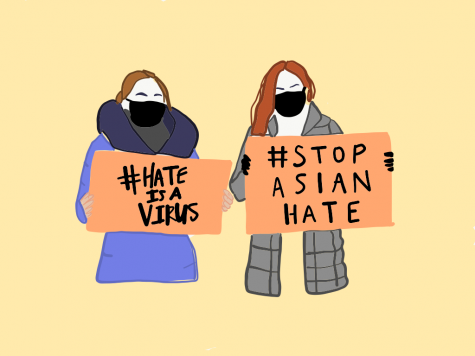Let’s talk about hate
Faculty and students reflect on forum created to process anti-Asian hate crimes
May 7, 2021

Since the tragic murder of eight Asian Americans in Atlanta, Georgia, the spread of anti-Asian hate crimes has gained massive attention towards confronting racism in American culture.
Facing emotions of lament, anger, confusion, and passion, faculty and students at Seattle Pacific University hosted an online forum on the evening of April 29 to process recent events and confront AAPI hate.
Bo Lim, a professor of old testament theology, moderated Thursday’s panel of staff and students.
“We pushed the event four weeks after the Atlatnta shooting and I wondered if the topic would fade from the news cycle, but week after week after week there have been ongoing hate crimes and violence, which is really sad, but all the more important that we needed to have this conversation,” said Lim.
Through discussion and conversation, the forum provided a space for the SPU community to process anti-Asian racism, explore Asian American identity and advocate against AAPI hate. Every panelist provided a different perspective to the issue at large by sharing their personal stories and ideas.
To provide a valuable learning experience and preserve the sincerity of the emotions present, the panel urged a balance between structure and natural conversation.
Psychology professor and panel member, Paul Kim, explained the event successfully touched upon a variety of topics through its open but structured format.
“We saw people building upon people’s stories in a way that made the experience a lot richer,” said Kim. “Because the topic is so personal to all of us, some of the stuff we shared was very heavy. People shared from their heart.”
At the core of every story was an interpersonal urge to care. Panel members used their experience to educate the audience on challenges the AAPI community faces.
Emily Nguyen, a junior nursing major, brought the student perspective to the panel and shared her personal conflicts when facing microaggressions and stereotypes. Her most valuable asset towards changing perspectives is her personal life.
“For me, I know I am good at being vulnerable in front of strangers and so sharing my story makes them aware of Asian American struggles” said Nguyen. “Conversations get people thinking and hopefully it sparks new ideas so that people can advocate for others”.
As a professor of psychology, Dr. Kim studies how the model minority myth is internalized by AAPI people. He observes how it disenfranchises the movement against anti-Asian racism inside the AAPI community.
“I’ve seen that when my Korean community responds to anti-Asian racism, they might say something along the lines of ‘our experiences aren’t as bad as black individuals’ experiences’. They may downplay the severity of racism or minimize the impact because it is ‘not as bad’ as other minority groups” said Kim.
Dr. Lim expressed his immense gratitude towards the panel members in their intimacy and transparency. He believes that forging relationships has the potential to change an entire culture of hate.
“I really appreciated my colleagues sharing from the heart. I don’t know about everyone, but I was moved. So now, racism is not just an issue, but these are people,” said Lim. “‘These are people I have friendship with, it’s that I know that person. That person lives in my dorm or I’m in that person’s classroom’ and so forth. The interpersonal relationship makes change more powerful and important.”
Although anti-Asian hate arrives at the intersection of many social movements such as Black Lives Matter and the protest against SPU’s statement of sexuality, one struggle must never be pitted against another. Instead, allyship and support can invigorate an all inclusive culture of change.
From diverse perspectives the panel expressed that strength arrives when groups support each other to achieve equality for all.
With that said, the conversation is left unfinished. Implications stretch far and wide in how AAPI hate can be dismantled and destroyed. Nguyen expresses that there is much more to be said.
“The stories on Thursday were so rich that we didn’t get to certain points. The hour and a half flew by so quick,” said Nguyen. “But it shows that it’s a very long process for things to change.”
Regardless of how long change takes, culture is not set in stone. Racism is alive and well and without conversations like the ones that occurred on April 29, there will be no end to hate.
“We need to change what people are talking about around the dinner table. We need to change what parents are telling their children. We need to change what jokes are being made and what things are found culturally acceptable,” said Lim. “I want our larger community to process Asian American identity, that is, we are American too. Asian American history is American history.”
SPU’s Asian American Student Association is hosting an open discussion with guest speakers on Wednesday, May 19th, at 6 pm to address anti-Asian Racism in America. Contact Emily Nguyen at [email protected] for more information. The Zoom meeting ID is 924-9670-2866.


























































































